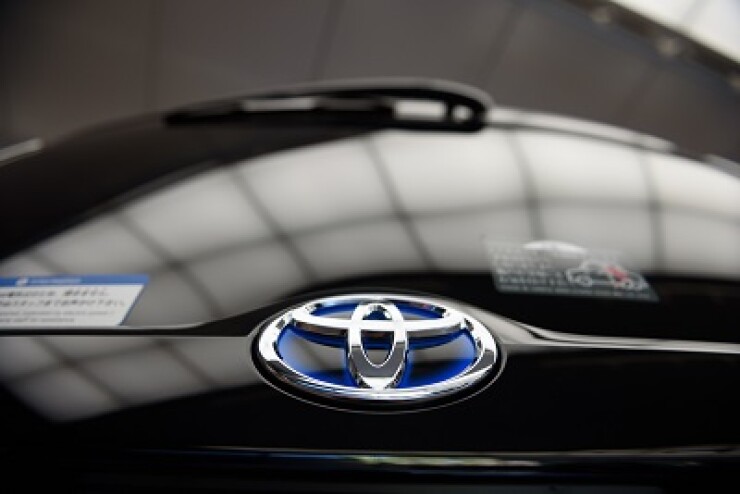Toyota Motor Credit Corp. and Fifth Third Bancorp’s auto lending arm are adding up to $3.1 billion in new prime-auto loan securitization deals into the ABS pipeline, according to presale reports.
Toyota plans to market either $1.25 billion or an upsized $1.75 billion package of notes backed by new- and used-car receivables, in its second auto-loan securitization for the year. Fifth Third is launching its first prime auto-loan securitization in two years with a $1.37 billion offering.
Prime auto-loan lenders have issued $18 billion in deals so far in 2018, including two apiece by Ford Motor Credit, CarMax and GM Financial, according to Finsight.com.
Toyota Auto Receivables 2019-B
Toyota Motor Credit Corp.’s 44th securitization of new- and used-auto loans will be its second securitization of the year, and will be at least $1.25 billion. The captive-finance lender is considering upsizing to a $1.75 billion pool for Toyota Auto Receivables Owner Trust (TAOT) 2019-B, similar to its first issuance of the year in February.
The transaction will include four tranches of Class A notes with preliminary triple-A ratings from Moody’s Investors Service and S&P Global Ratings. Those include the Class A-1 tranche that, despite having a near-term maturity of August 2020, were not assigned short-term ratings affiliated with money-market tranches.
Class A-1 will consist of either $316.01 million or $442.01 million in notes, depending on the upsizing decision. The Class A-2 tranche will have $443.8 million or $621.6 million of three-year fixed- and floating-rate notes due February 2022; the Class A-3 notes will be $368.9 million or $516.6 million, and due August 2023; and the Class A-4 notes will be $90.04 million or $126.04 million, with a November 2024 final maturity. All notes are backed by 2.75% credit enhancement, similar to recent TAOT transactions.
A double-A rated Class B subordinate note tranche is to be sized at either $31.25 million or $43.75 million.

The $1.75 billion pool will be backed by a portfolio of $1.9 billion across 102,324 loans, while the smaller pool consists of 72,945 loans with a securitized balance of $1.36 billion. Both pools have a preponderance (82%) of new-car loans, plus a borrower weighted average FICO of 761 and APR of 2.56%.
Either pool also has equal share (39% each) of passenger sedan and sport utility vehicle collateral.
The only credit challenges to the deal noted by Moody’s was the high proportion of extended-term loans (61-75 months), which make up 55% of the pool balance, and an interest-rate exposure to the floating-rate Class A-2B notes. S&P noted that the percentage of loans with original terms between 61-72 months declined to 19.71% from 22.84% in the prior deal.
All of the loans were drawn from Toyota Motor Credit’s managed portfolio that ended 2018 with $53.3 billion in accounts. Delinquencies declined to 2.14% from 2.44% the year prior, reversing five consecutive years of rising levels of 30-plus day late-pays. Net losses declined year-over-year as well (to 0.49% from 0.57%).
Moody’s expected net losses of 0.6% and S&P projected net loss range of 0.55%-0.65% are each unchanged from the trust’s recent transactions. Loss ranges in outstanding TAOT securitizations from 2014-2017 are ranging between 0.4%-0.7%, among the lowest in the industry, according to Moody’s.
Bank of America Merrill Lynch is the underwriter.
Fifth Third Auto Trust 2019-1
Fifth Third, via Credit Suisse, will market $1.37 billion in senior notes in its first prime auto-loan securitization since September 2017 and the regional bank’s 12th overall asset-backed deal from the platform.
Fifth Third Auto Trust 2019-1 will include a $300 million offering of money-market notes due May 2020; a $500 million tranche of fixed- and floating rate notes due May 2022 that make up 34.88% of the pool balance; a Class A-3 tranche of notes totaling $430 million due December 2023; and a $139.7 million in Class A-4 notes due November 2026. All the bonds benefit from 4.7% credit enhancement.
The term notes are all triple-A rated. The one year notes carry the preliminary P-1 short-term rating from Moody’s and A-1+ from S&P.
Moody’s cumulative net loss expectation is 1%; S&P’s loss range expectation is lower at 0.65%-0.75%.
Fifth Third’s loan pool has a high weighted average FICO of 755, an average original term of 69 months and an average loan-to-value of 92% on 80,027 loans with a total balance of $1.43 billion.
The FICO, original term and LTV levels are similar to Fifth Third’s $1.06 billion deal in 2017, but the weighted average APR is higher at 5.77%. The loans, with an average remaining size of $17,918, are seasoned an average of 11 months, according to presale reports.
The pool is split between 47% new-vehicle and 53% used-car collateral.
As of Dec. 31, Fifth Third Bancorp’s auto lending subsidiary held approximately $8.4 billion in receivables.





